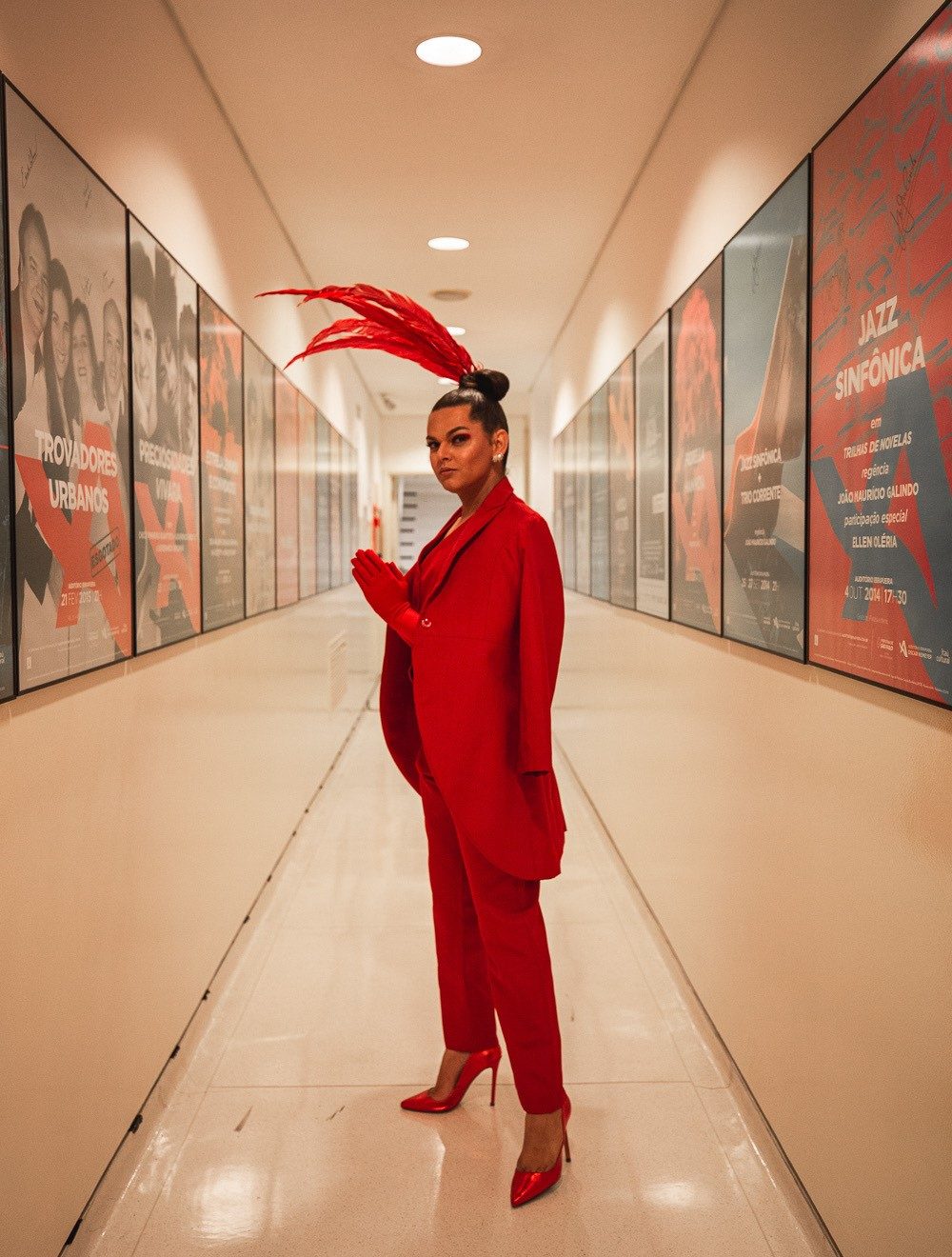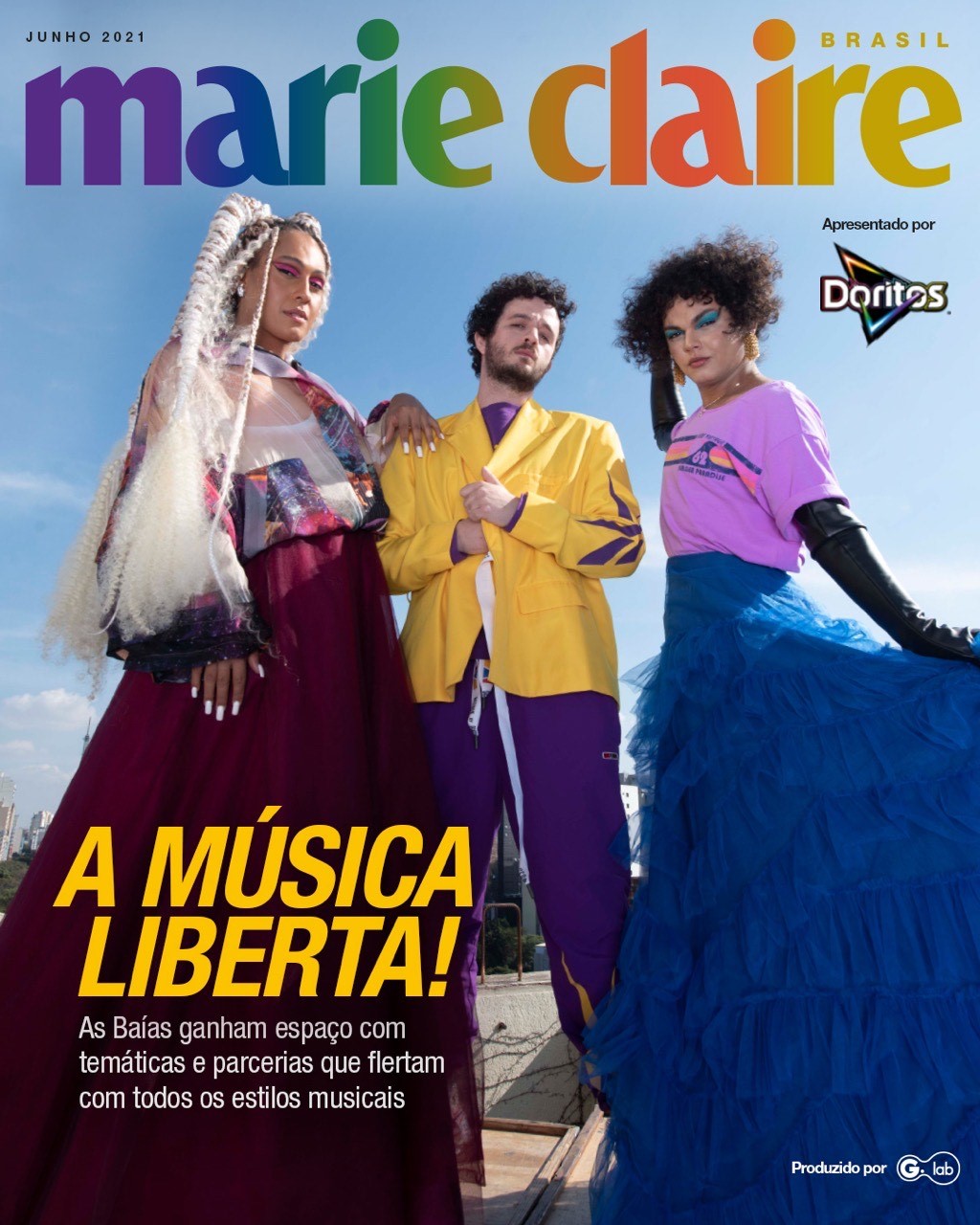Assucena Assucena on Creative Expression and Identity

We had the opportunity to chat with up-and-coming Jewish Brazilian artist Assucena Assucena, as she celebrates her two consecutive Latin Grammy nominations with her band As Baías—and breaks barriers as the first trans artist to be nominated for the award alongside her fellow bandmate Raquel Virgínia. Read more about our conversation where we talk everything from Jewish and LGBTQ+ identity in Brazil, music and culture in Israel, to the power of self-expression through the arts.
Tell us about yourself– what ignited your passion to make music your career?
Music is a place where I am constantly surprised. Music calms my fears, but it also challenges me to think differently like all art. My family always listened to a lot of music around the house, so I grew up by the record player, imitating my greatest musical influences; ranging from Ofra Haza, Fortuna, Gal Costa, Elza Soares, Sarah Vaughan to Whitney Houston. I love the great divas, because singing their works is a fun challenge. That’s how I learned to sing – by training my ear, listening to their music.
Between the ages of 9 and 14, I had a scholarship for my language program (English and Spanish) that required me to become a soloist in the program’s youth’s choir. Then, the connections I made while attending University of São Paolo led me to meet the people who would soon become members of my band, As Baías. I think it was music that chose me, because even when I detoured away from it, my path always somehow came back to music.

How have you seen the Jewish community in Brazil change or evolve in recent years?
I believe that we are in a transition phase, moving toward building a stronger political awareness in which our Jewish institutions will become more pluralistic. Jewish institutions in Brazil have more conservative tendencies because they have been occupied by conservative leaders–the majority of progressive Jews distanced themselves or had little interest in holding executive positions, which prevented us from creating a more democratic and diverse environment.
With the coup against Brazil’s former president Dilma Roussef in 2016 and Bolsonaro’s accession to the presidency in 2019, progressive Jews felt the need to self-organize against this neo-fascist party that took power. The current government uses Nazi vocabulary to promote itself. We had an awful rereading of Nazi propaganda by Joseph Goebbels–it was read by the Minister of Culture, who was dismissed due to major political pressure from the progressive Jewish community. From the context of our current political situation, several collectives have now appeared, including Judeus pela Democracia and Instituto Brasil Israel, to mention a few. There have also been new Jewish LGBTQ collectives such as Mov LGBTQIA+, G’aavah (IBI), and Hineni (FISESP)– the first LGBTQ commission linked to an Israeli federation in Brazil. All these collectives promote a political debate in defense of democracy.

As an activist for both LGBTQ+ and Jewish causes, how do you feel this plays a role in the music that you make?
I believe that I bring more of that in my representation as a public figure, being a trans woman, than in my music itself. Music is an art, and in art I can talk about what I want: futile things, flirting, love, or politics. However, the things I face in my daily life or the things I see happening around me drive me to fight the inequalities that reinforce prejudices against the LGBTQ+ community in Brazil. We still have much work to do to guarantee our rights, and this current government is a step backwards.
Israel is often cited as one of the world’s most important cultural centers. What aspects of Israel’s rich culture and history do you seek to bring to São Paulo?
I aim to bring elements of Mizrahi and Sephardic culture, as Mizrahim and Sephardim make up more than 55% of the Israeli population. I grew up listening to Israeli singer Ofra Haza and Fortuna, who is a great Brazilian singer of Jewish-Syrian origin. Introducing Mizrahi and Sephardic culture to my community in São Paulo helps connect the Brazilian people to their own history. Actually, a large part of Brazil’s ethnic substratum comes from Jews who were forced to convert to Christianity during the Inquisition in Portugal and Spain. I had the great honor of recording some songs with Fortuna. I also still dream of partnering with Danna International, the world’s first transgender popstar, who is Israeli. Whenever I can, I share these progressive facets of Israeli society.
Do you listen to music as part of your creative process? If we borrowed an ear bud, what tracks would we hear?
Very much. You’d hear Gal Costa, Caetano Veloso, Sarah Voughan, Noa(Achinoam Nini), The Weeknd, Rosalía. And an Israeli singer that I have been listening to a lot to is Netta Barzilai.
Do you remember the moment you found out that your groundbreaking band As Baías was nominated for two Latin GRAMMYs? What rush of emotions was going through your head? How does it feel to know that you and your fellow band member Raquel Virgínia are the first trans women to have been nominated for this honor?
It was feelings of ecstasy with also a bit of relief. It is not easy to be part of the cultural sector in Brazil–positions of power are still dominated by conservative men. Despite this, many women and members of the LGBTQ+ community have conquered our spaces of cultural and self-expression. Music has this power to break down barriers. Our [As Baías’s] two consecutive nominations have shown us that we are on the right path. We are certainly not the first trans artists to try for a Latin Grammy, but the situation has given us a pioneering spirit. Opening the door for other trans artists to attain such an important award is a step to seal trans people’s place in the music market with dignity.
What would you encourage arts organizations like AFIPO do to be more inclusive of a multitude of identities?
An efficient policy is proven in practice. I think that any institution that praises diversity, inclusivity and democratic values can build mechanisms for partnerships in both executive and creative sectors. The more diverse a company is, the stronger is the worldview that it can embrace.

Hungry for more great AFIPO and Israel Phil content? Check this out!
COEXISTENCE THROUGH MUSIC
Each year, the KeyNote program reaches more than 22,500 children in Israel.
Read More


